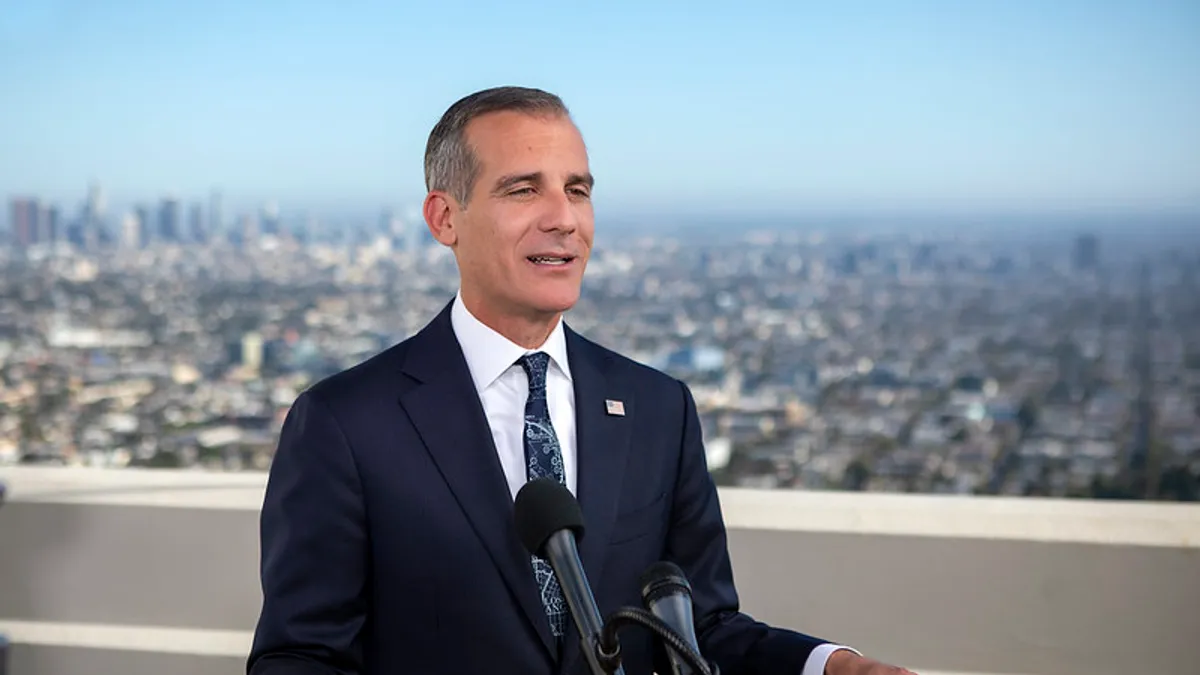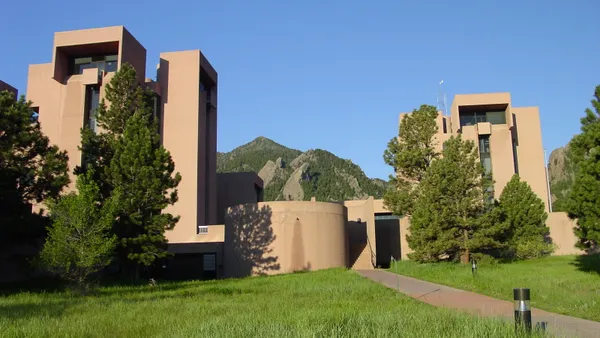Los Angeles Mayor Eric Garcetti presented his proposed 2021-2022 fiscal year budget in a State of the City address earlier this week that put the emphasis on one word: justice.
He used the word about 16 times throughout the 47-minute speech Monday night, and efforts to achieve justice are at the heart of the proposed budget.
It calls for a billion-dollar investment to promote economic and racial justice, including $791 million to confront homelessness and $24 million to create the country’s "largest guaranteed basic income pilot to date," and the creation of an advisory committee to inform a potential slavery reparations program.
Join us live for our annual State of the City address.
— MayorOfLA (@MayorOfLA) April 20, 2021
Together, we can recover, rebuild, and reimagine a more just, resilient, sustainable, equitable and fair city for every Angeleno.#SOTC2021 https://t.co/r82p384qJp
The "justice budget" offers a road map to a more equitable city, according to Garcetti, and it's the largest budget his administration has ever presented. It could serve as a model to other cities as they work to recover from the economic challenges of the pandemic while maximizing federal relief dollars to invest in a more equitable future.
"The Mayor's proposed budget provides the funds necessary to address the City's continuing homeless crisis and the needs of various communities across the city," Councilmember Paul Krekorian, chair of the Budget and Finance Committee, said in a statement.
"At the same time, it builds historic reserves to prepare us for further uncertainty and economic volatility during the pandemic, which is critical as we continue to grapple with its effects on local revenue and public health," Krekorian said.
$791 million to address homelessness
Homelessness increased for the fourth year in a row across the country in 2020, according to a pre-pandemic point-in-time count, growing 2% nationwide and nearly 7% in California. The pandemic has only exacerbated those challenges.
Garcetti’s proposed investment to mitigate homelessness represents the largest-ever amount in the city’s history — the budget would more than double what the city currently spends on homelessness.
Key investments include
-
About $200 million to fund affordable housing development, homeless prevention, eviction defense, and other services
-
$57 million to support nine more "cleaning and rapid engagement" teams, which are neighborhood-based groups that provide public health aid to encampments
-
$43 million to fund Project Roomkey, a program through the state, county and Los Angeles Homeless Services Authority that provides hotel and motel rooms to people experiencing homelessness
-
$700 million for the city’s Emergency Rental Assistance program, providing direct relief for individuals to pay rent and utilities, with $300 million of that total coming from the American Rescue Plan
$24 million for a guaranteed basic income pilot
From Chicago to Jackson, Mississippi, a growing number of cities are considering or implementing guaranteed basic income programs, an effort largely started by Stockton, California, under then-mayor Michael Tubbs.
Los Angeles’ proposal calls for the "largest guaranteed basic income pilot of any city," according to Garcetti. The city would invest $24 million to provide $1,000 per month to 2,000 in-need households for a year — "no questions asked," Garcetti said during his speech.
Groups like Mayors for a Guaranteed Income have urged the Biden administration to implement recurring direct payments to U.S. residents across the country. "The quickest and most direct way to help people and the economy is by putting money directly into people’s pockets," the group said in a statement.
$500,000 investment to explore reparations
The mayor’s budget allocates $500,000 for a reparations commission, an advisory body to help spur the creation of a pilot slavery reparations program for the city’s Black residents.
Los Angeles’ exploration into a reparations program follows a recent U.S. House Judiciary Committee decision to advance a bill that would create a commission to address the effects of slavery.
"The bill would create a 13-member commission that would study the effects of slavery and racial discrimination, hold hearings and recommend 'appropriate remedies' to Congress," a statement from the Congressional Black Caucus states. "That commission would also consider what form a national apology could take for the harm caused by slavery."
1/3 This is a historic, monumental, and unprecedented day! For the first time in the history of the United States, the horrible negative impact of slavery will be front and center in the United States Congress during the House Judiciary Full Committee Markup of my bill, H.R. 40 pic.twitter.com/WQy4ptuXia
— Sheila Jackson Lee (@JacksonLeeTX18) April 14, 2021
Evanston, Illinois, is the first locality in the country to offer reparation payments to its Black residents, providing qualifying individuals with $25,000 to spend on down payments, home repairs or other property needs. Several other cities, including St. Paul, Minnesota, are also following suit.
As Smart Cities Dive continues to report on cities' financial recovery from the pandemic, we'd love to hear from you: How is your city implementing similar investments? You can dig into into Los Angeles' budget below and reach us at [email protected].













